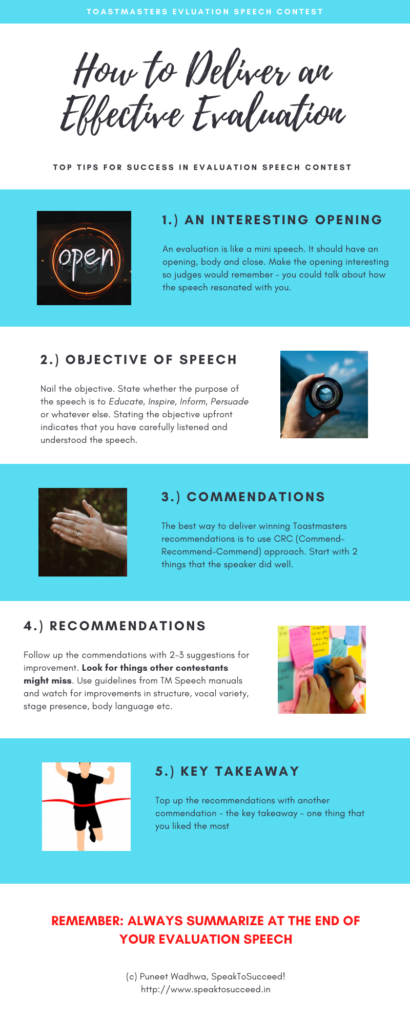Here are a few top tips on delivering effective evaluations in your pursuit to win the Toastmasters Evaluation Speech Contest. These tips are based on my personal experience and which have helped me reach the District 41 Finals of Toastmasters Evaluation Speech contest in 2018.

A Toastmaster evaluation speech is just like any other speech after all, so it should have a well-crafted introduction, good structure, content and memorable closing. The structure based on Toastmasters CRC model (Commend, Recommend, Commend) which I follow, and which has worked very well for me, is as below.
Opening:
Make the opening interesting so judges would remember – you could talk about how the speech resonated with you or narrate an incident from your personal life that connects with the speech. You could also talk about the speech and its relevance to the audience in the room.
Objective:
Nail the objective. State whether the purpose of the speech is to Educate, Inspire, Inform, Persuade or whatever else. Stating the objective upfront indicates that you have carefully listened to and understood the speech.
Commendations:
The best way to deliver winning Toastmasters recommendations is to use the CRC (Commend-Recommend-Commend) approach.
CRC approach is an ideal way of delivering evaluations since it first encourages the speaker by offering him praise on things he did well – follows it up by giving suggestions for improvement – and offers more commendations to add the cherry on top of the cake.
Recommendations:
Follow up the commendations with 2-3 suggestions for improvement. Look for things other contestants might miss. A few pointers to things to watch out in the speech:
- Relevance to Audience – Is the speech relevant? Say, does it crack jokes on IT geeks for non-IT audience?
- Stepping on laughter – Did the speaker give enough time between jokes for audience to absorb the humor?
- Proper pauses – Did the speaker have adequate pauses at the right places to enhance the impact of the speech?
- Body language – Did the speaker show good body language? Was the speaker confident? Did he/she have good eye contact?
- Speech structure – Was the speech structure easy to follow?
- Stage usage – Did the speaker utilize the stage purposefully? Was his stage choreography as per the flow of the speech?
- Vocal variety – Watch out for tone, pitch, volume and other vocal variety related suggestions
- Use guidelines from TM Speech manuals and watch for improvements in various areas
The Key Takeaway:
Top up the recommendations with another commendation – the key takeaway – one thing that you liked the most.
Summary:
Do NOT FORGET to summarize your recommendation by stating the key points from your evaluation and closing your evaluation speech with a memorable closing. Please look at the evaluation contest ballot below to learn various areas where a contestant is scored in the Toastmasters evaluation speech contest. As you can see, there are 15 Marks for summation.

Kindly also read my other articles on Speech Contest Preparation:
- Speech Writing tips for The International Speech Contest
- Speech Rehearsal Techniques to ensure the best performance
- Powerful tips to manage your stage fear and public speaking anxiety
About the Author
Puneet Wadhwa, the author of this blog – Speak to Succeed! is an IT Business Executive by profession, and a Public Speaker and Leadership trainer by passion. He has been professionally speaking for many years and has won several awards for his public speaking engagements. He presents corporate trainings and seminars to corporations and associations whose people want to speak and lead effectively. To contact Puneet, email him at pwadhwaspeaks@gmail.com or fill out the contact form at https://www.speaktosucceed.in/about-me/.




